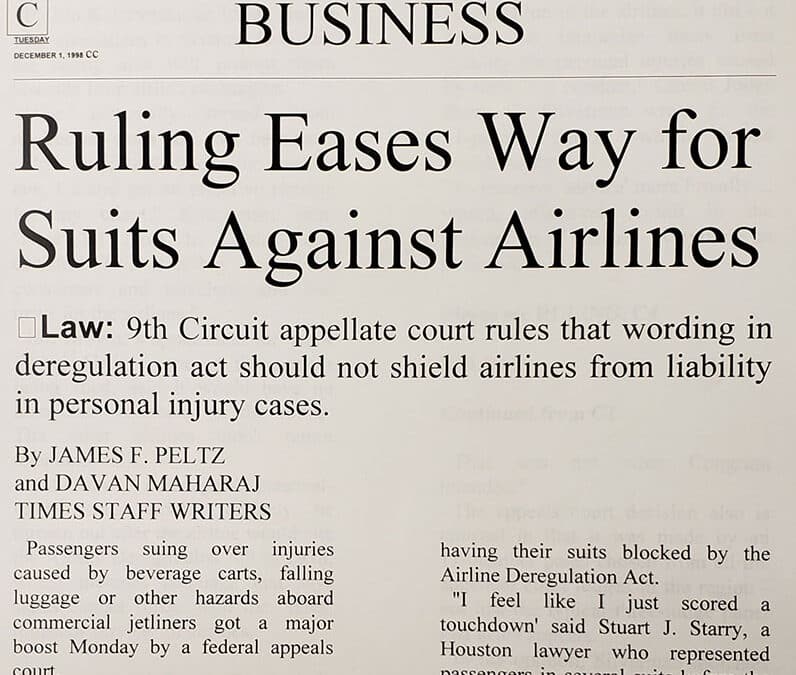LOS ANGELES TIMES
LAW: 9th Circuit Appellate Court Rules That Wording In Deregulation Act Should Not Shield Airlines From Liability In Personal Injury Cases
Passengers suing over injuries caused by beverage carts, falling luggage or other hazards aboard commercial jetliners got a major boost Monday by a federal appeals court.
The U.S. 9th Circuit Court of Appeals in San Francisco said passengers with personal-injury claims can go ahead and sue the airlines for negligence–without having their suits blocked by the Airline Deregulation Act.
“I feel like I just scored a touchdown,” said Stuart J. Starry, a Houston lawyer who represented passengers in several suits before the appellate court.
The appellate court ruling is binding in California and eight other Western states, but Starry and other lawyers said the decision will have an effect nationwide, giving new life to hundreds of personal-injury cases pending against airlines.
“Now you’ll see a lot of cases start to settle” out of court “because the parties will now have to come to the table” because of this decision, he said.
Phillip Kolczynski, an Irvine lawyer who specializes in aviation law, said the ruling also will prompt more lawsuits from airline passengers.
“I’ve personally turned down negligence cases like that because I didn’t think that, under the current law, I could get an effective remedy for my client,” Kolczynski said. “Now I’ll have to rethink that decision. This is a big victory for consumers and travelers, and bad news for the airlines.”
Jim Brown, a spokesman for Trans World Airlines, one of the carriers being sued, said it would have no immediate comment on the ruling. The other airlines didn’t return telephone calls.
Until now, passengers’ personal-injury suits would routinely be thrown out after the airline would cite the Airline Deregulation Act of 1978, which includes language that says states cannot tinker with the “rates, routes or service” of airlines.
The courts took “service” to include flight attendants, beverage carts and luggage equipment, and so would block the suits from going forward.
But the appeals court–reversing even its own past decisions–ruled Monday that “service,” as used in the deregulation act, referred to the frequency and scheduling of flights, and not to matters such as passengers being injured by beverage carts or by flight attendants.
“When Congress enacted federal deregulation of the airlines, it did not intend to immunize them from liability for personal injuries caused by their . . . conduct,” Circuit Judge Barry G. Silverman wrote for the 11-judge panel, which voted unanimously.
“To interpret ‘service’ more broadly . . . would effectively result in the preemption of virtually everything an airline does. That was not what Congress intended.”
The appeals court decision also is unusual in that it was made by an 11-member panel chosen from all the appellate court judges in the region–not just the typical three-judge panel that hears appeals. In his opinion, Silverman indicates that the court has been bothered by past interpretation of the deregulation law banning personal-injury cases, and says that with several cases pending again, it was time for the full court to review the law.
Starry, the Houston lawyer, said it was the first time a court had so thoroughly rejected use of the deregulation law to preempt a personal-injury suit’s going forward. “It’s the first time that any court has delved into the legislative history of this act and understood it,” he said.
Starry is representing four passengers of the five whose cases were before the appellate court. Two are suing TWA, another is suing Continental Airlines, and a fourth has a suit against American Airlines, a unit of AMR Corp. All four allege they suffered injuries at the hands of the carriers. One alleges that he suffered a dislocated shoulder and other injuries after a flight attendant hit him with a service cart. Another claims she broke her arm and suffered other injuries when she tripped over a piece of luggage allegedly left in the aisle by a flight attendant.
The court opinion means that three-judge panels that have dismissed passengers’ suits will now have to reconsider their rulings.


Recent Comments